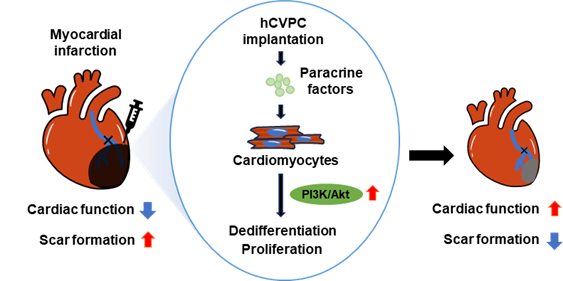A recent study led by Prof. YANG Huangtian’s group at the Shanghai Institute of Nutrition and Health (SINH), Chinese Academy of Sciences (CAS) revealed the novel role of human embryonic stem cell-derived cardiovascular progenitor cells in stimulating cardiomyocyte cell cycle activity.
The study entitled “Human embryonic stem cell-derived cardiovascular progenitor cells stimulate cardiomyocyte cell cycle activity via activating the PI3K/Akt pathway” was published in Journal of Molecular and Cellular Cardiology, sponsored by International Society for Heart Research, on Oct.16 2024.
Promoting endogenous cardiomyocyte proliferation is crucial for repairing infarcted hearts. Implantation of human pluripotent stem cell-derived cardiovascular progenitor cells (hCVPCs) promotes healing of infarcted hearts. However, the mechanisms underlying the reparative effects of hCVPCs remain largely unexplored, and little is known about their impact on proliferation of host cardiomyocytes in infarcted hearts.
The researchers from SINH observed that implantation of hCVPCs into the infarcted hearts of mice induced dedifferentiation and cell cycle re-entry of cardiomyocytes, concomitant with the improvement of cardiac function and reduction of scare formation. This was further confirmed in vitro showing that the secretome of hCVPCs induces dedifferentiation and proliferation of isolated adult cardiomyocytes.
Mechanistically, the myocardial infarction(MI)-induced Akt activation, cardiomyocyte dedifferentiation and cell cycle activation were significantly enhanced by hCVPC implantation, while they were totally reversed by inhibition of the PI3K/Akt pathway, accompanied by the abolishment of hCVPC-mediated reparative effects. Similar observations were obtained in the hCVPC-conditioned medium-treated adult cardiomyocytes.
In summary, this study provides initial evidence demonstrating that the paracrine signaling of hCVPCs induces dedifferentiation and cell cycle activation of host cardiomyocytes via activation of the PI3K/Akt pathway in the infarcted hearts. The findings also highlight a strategy utilizing cells at early developmental stages to rejuvenate adult cardiomyocytes.
This work was obtained the support from Prof. CAO Nan from Zhongshan School of Medicine, Sun Yat-Sen University and funded by grants from National Key R&D Program of China.

hCVPCs stimulate cardiomyocyte cell cycle activity via activating the PI3K/Akt pathway.
(Image provided by Prof. YNAG Huangtian's team)
Media Contact:
WANG Jin
Shanghai Institute of Nutrition and Health,
Chinese Academy of Sciences
Email: wangjin01@sinh.ac.cn
Web: http://english.sinh.cas.cn/

